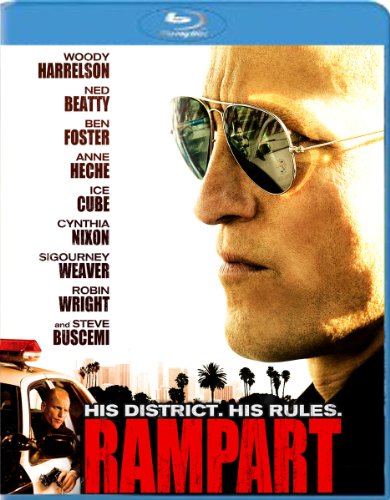All Nonfiction
- Bullying
- Books
- Academic
- Author Interviews
- Celebrity interviews
- College Articles
- College Essays
- Educator of the Year
- Heroes
- Interviews
- Memoir
- Personal Experience
- Sports
- Travel & Culture
All Opinions
- Bullying
- Current Events / Politics
- Discrimination
- Drugs / Alcohol / Smoking
- Entertainment / Celebrities
- Environment
- Love / Relationships
- Movies / Music / TV
- Pop Culture / Trends
- School / College
- Social Issues / Civics
- Spirituality / Religion
- Sports / Hobbies
All Hot Topics
- Bullying
- Community Service
- Environment
- Health
- Letters to the Editor
- Pride & Prejudice
- What Matters
- Back
Summer Guide
- Program Links
- Program Reviews
- Back
College Guide
- College Links
- College Reviews
- College Essays
- College Articles
- Back
Rampart
“Rampart” is a movie that has so much going for it that you wish it would be better. The director, Oren Moverman (“The Messenger”) has gathered a number of parts that would seem ideal in making a good, old-fashioned crime noir picture.
To start with it takes place in L.A., which as we know is a Mecca of the crime genre. It’s not the sparkling, postcard side of L.A. but instead the rough, seedy underbelly. Bobby Bukowski’s gritty, sometimes blurry and saturated cinematography brings out the danger and hostility in the tough neighborhoods where most of the movie takes place. Furthermore it takes place in the midst of the fallout of the Rampart Scandal, a corruption scandal that plagued the LAPD in the late 1990’s.
And to top it all off, at the center of the film is one of those cops, Dave Brown (Woody Harrelson in one of his best film roles), who is a total enigma. On one level he’s like Harry Callahan in “Dirty Harry,” racist, intimidating, has his own rulebook for delivering police justice but also cool and collected. Then at other times he’s utterly sleazy: He drinks and smokes, and goes to a tavern every night and picks up a different girl. But then he has two daughters, to whom he has been a terrible father and wants to atone for all his past mistakes.
All of that should add up to a compelling film but it doesn’t. Visually the movie is strong. The atmosphere and the texture of the picture is just right and Moverman stages some grotesquely nightmarish sequences, like when Dave goes to an underground sex club one night, complete with flashing red and blue lights.
No, the problem lies in the script, which is unfortunate because it’s co-written by Moverman and famous crime fiction writer James Ellroy (who wrote “L.A Confidential”). There isn’t exactly a plot, per se, it’s a character study about Dave, following him down a dark path of no return. He’s in basically every scene so all the other events (as well as the other characters) gravitate around him and frankly not a lot happens.
Ellroy and Moverman introduce a lot of intriguing plot points and side stories: Dave gets paranoid that he’s being watched and set up by the department, thinking that they are going to dump all their dirty laundry from the Scandal on him since he has a bad record. One of the women Dave hooks up with, Catherine (Anne Heche), is a Femme Fatal lawyer for criminals suing the department. Dave has a crooked friend played by Ned Beatty, who lets him in on illegal activities he can partake in to get some extra money. And Ice Cube as a black lawyer is on his case about a recent crime he’s supposedly covering up.
But they don’t find a way to connect them, or at the very least bring them to a conclusion. I’m not saying all the loose ends need to be tied up but most are left out there hanging. The Ice Cube character is particularly interesting because he adds racial tension, and one of the main problems that have always troubled the LAPD is racism but the movie barely does anything with it. So it meanders, following Dave from one point to another until it eventually cuts off without any real conclusions.
All of this is such a shame to report because the character of Dave is very interesting and seeing him wrestle with his different morals is the most fascinating quality about him. On one hand he doesn’t seem to care about anything, he’s in the middle of all these hearings for all his past and current crimes but he’s not worried, like he has nothing to live for. However at the same time he still puts on his uniform and badge and does things according to his sense of what’s right and wrong. Numerous times he insists he only kills the people who deserve it, like racists and no good street thugs.
Harrelson is able to play all the different dimensions perfectly. He can be the cool, confident “honest” police officer Dave as well as the pathetic and remorseful Dave. He neither overacts nor underacts, and when he’s in tense and violent situations he can be ice cold.
Speaking of violence, another weakness of the film is that it needed more of a dramatic punch. Toward the beginning a random vehicle hits Dave’s squad car, he gets out only to chase the other driver down and nearly beat him to death. Frankly, it needed more of that, more abrupt and shocking violence like the kind “Drive” had. Just to get us on the edge of our seat because, while Dave may walk down those Los Angeles streets with ease, the rest of the movie just sort of sits there.
Similar Articles
JOIN THE DISCUSSION
This article has 0 comments.

